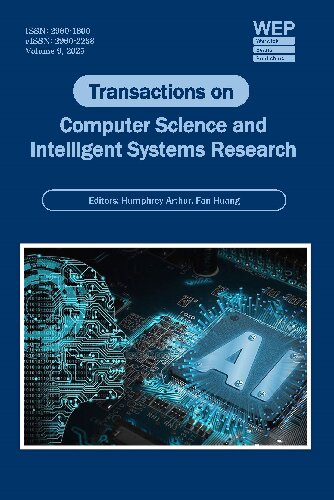Key Applications of AI Question-Answering Systems: Research and Technical Analysis Based on Game Text and Dialogue
DOI:
https://doi.org/10.62051/fhj73a81Keywords:
AI Question-Answering Systems; NPC Dialogue Generation; Video Games; Language Models.Abstract
With the rapid development of the global gaming industry, artificial intelligence (AI) applications in games have garnered increasing attention. In role-playing and open-world games, particularly, the intelligence of non-Player Characters’ (NPCs) dialogue systems is critical to enhancing player experience and interactivity. This paper investigates the applications of AI question-answering (QA) systems in gaming contexts by analyzing mainstream algorithms and models, their implementation workflows, advantages, and limitations. Additionally, it explores the challenges and future directions for AI-driven QA systems. The findings demonstrate that AI QA systems significantly improve game immersion and interactivity, particularly in dynamic dialogue generation and personalized narrative design. However, computational resource constraints and real-time performance remain major challenges. Future research should focus on reducing computational overhead, improving semantic accuracy, and enabling flexible adaptation of AI QA systems across diverse game genres. This study provides innovative insights for game developers and offers implications for extending AI applications to other domains.
Downloads
References
[1] J. Clement, Video game industry - Statistics & Facts, Statista. Published on Nov. 6, 2024. Retrieved on Apr. 4, 2025. Retrieved from: https://www.statista.com/topics/868/video-games/.
[2] R. Volum, S. Rao, M. Xu, G. DesGarennes, C. Brockett, B.V. Durme, O. Deng, M. Akanksha, B. Dolan, Craft an Iron Sword: Dynamically Generating Interactive Game Characters by Prompting Large Language Models Tuned on Code. In Proceedings of the 3rd Wordplay: When Language Meets Games Workshop (Wordplay 2022), pages 25 – 43, Seattle, United States (2022).
[3] Y. He, Inside and Outside of The Game—The Dilemma of Reinforcement Learning in AI. CAAI Transactions on Intelligent Systems, 17 (2): 220 - 220 (2022).
[4] M.Y. Kim, J. Rabelo, K. Okeke, R. Goebel, Legal Information Retrieval and Entailment Based on BM25, Transformer and Semantic Thesaurus Methods. Rev Socionetwork Strat 16, 157 – 174 (2022).
[5] D. Chen, A. Fisch, J. Weston, A. Bordes, Reading Wikipedia to Answer Open-Domain Questions. In Proceedings of the 55th Annual Meeting of the Association for Computational Linguistics (Volume 1: Long Papers), pages 1870–1879, Vancouver, Canada (2017).
[6] A. Babu, S.B. Boddu, BERT-Based Medical Chatbot: Enhancing Healthcare Communication through Natural Language Understanding. Exploratory Research in Clinical and Social Pharmacy, vol. 13, 100419 (2024).
[7] Y.J. Kim, J.H. Kim, Y.M. Kim, S. Song, H.J. Joo, Predicting medical specialty from text based on a domain-specific pre-trained BERT. International Journal of Medical Informatics, vol. 170, 104956 (2023).
[8] M.H. Syed, S.-T. Chung, MenuNER: Domain-Adapted BERT Based NER Approach for a Domain with Limited Dataset and Its Application to Food Menu Domain. Applied Sciences, 11 (13), 6007 (2021).
[9] S. Risi, M. Preuss, From Chess and Atari to StarCraft and Beyond: How Game AI is Driving the World of AI. Künstliche Intelligenz 34, 7 – 17 (2020).
[10] L.F. Xu, T. Zuo, AI-based Open-World Text Adventure Game: A Case Study of AI Dungeon. Publishing Reference, (2), 19 – 23 (2021).
[11] A.J. Jinia, K.L. Chapman, S. Liu, C. Della Biancia, A. Li, J.M. Moran, Challenges in Developing an AI-Based Analysis System for Incident Learning. International Journal of Radiation Oncology*Biology*Physics, 120(2, Supplement), e542 (2024).
[12] A. Håkansson, G. Phillips-Wren, Generative AI and Large Language Models - Benefits, Drawbacks, Future and Recommendations. Procedia Computer Science, 246, 5458 – 5468 (2024).
[13] J.P.W. Hardiman, D.C. Thio, A.Y. Zakiyyah, Meiliana, AI-powered dialogues and quests generation in role-playing games using Google's Gemini and Sentence BERT framework. Procedia Computer Science, 245, 1111 – 1119 (2024).
[14] D.T.K. Ng, E.K.C. Chan, C.K. Lo, Opportunities, challenges and school strategies for integrating generative AI in education. Computers and Education: Artificial Intelligence, 8, 100373 (2025).
Downloads
Published
Conference Proceedings Volume
Section
License
Copyright (c) 2025 Transactions on Computer Science and Intelligent Systems Research

This work is licensed under a Creative Commons Attribution-NonCommercial 4.0 International License.














